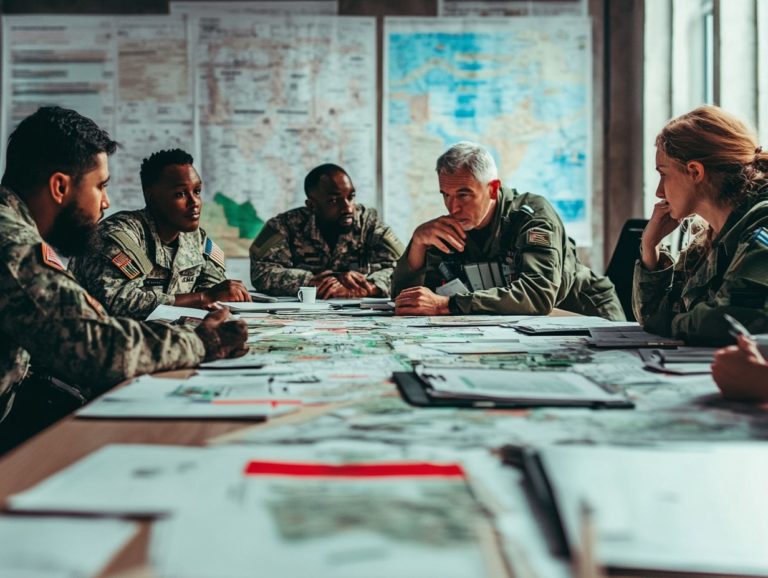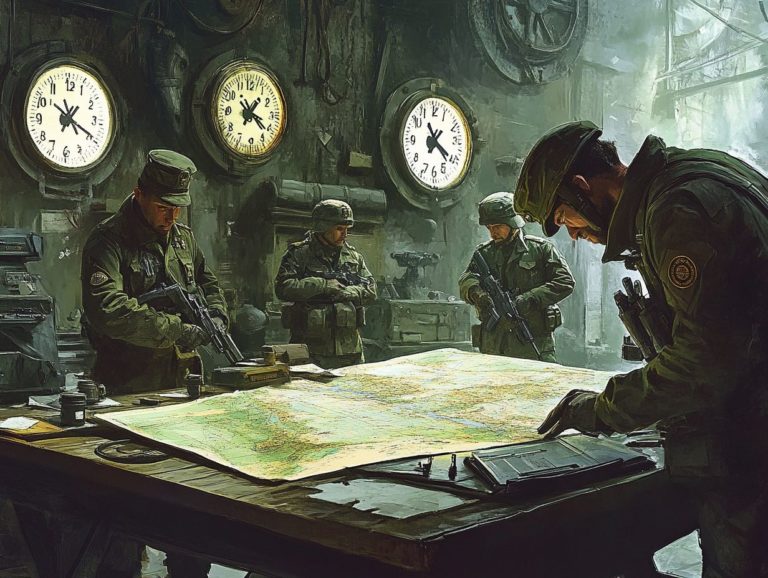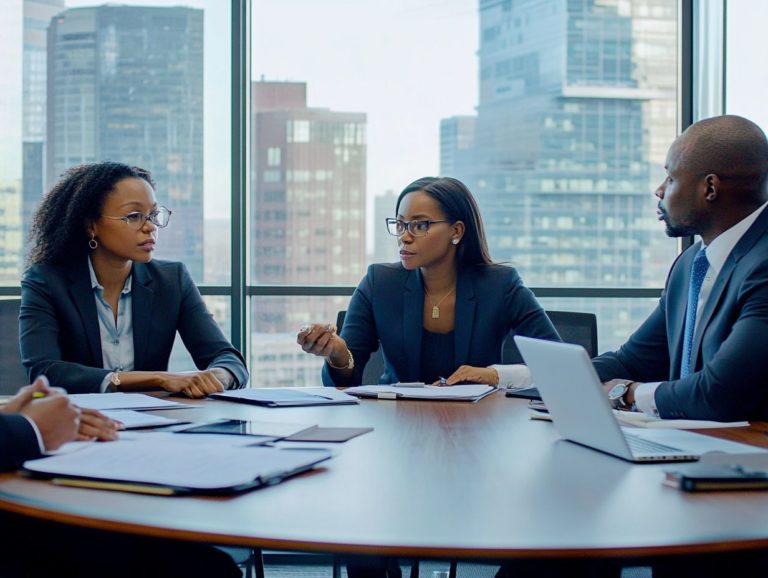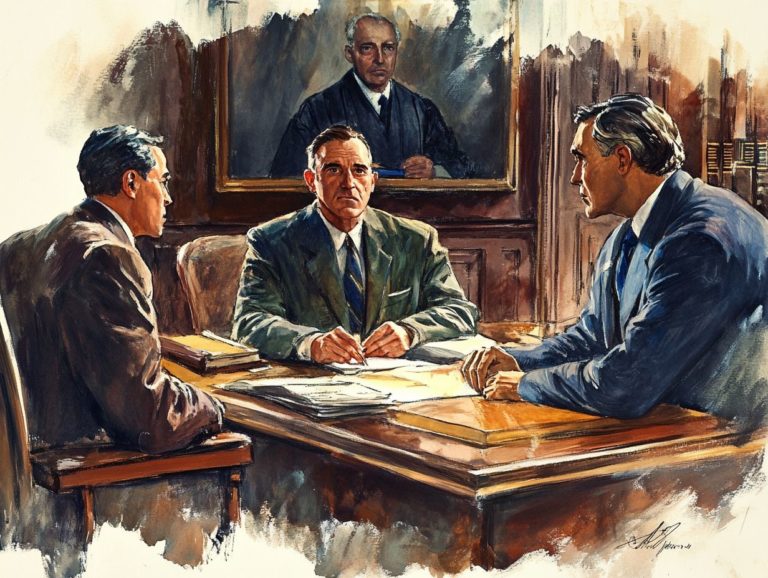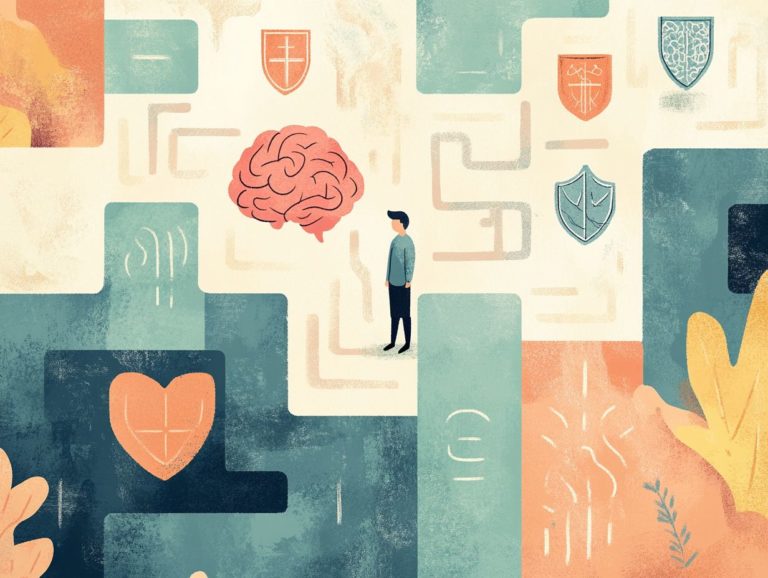The Role of Defense Counsel in Strategies
In the intricate landscape of the legal system, your role as defense counsel is paramount. From constructing a strong defense to effective communication with clients, you play an essential part in navigating the complexities of criminal cases.
This article explores the diverse strategies and tactics you employ as a defense attorney, the importance of expert witnesses, the art of negotiating plea deals, and careful preparation for trial.
Discover how these elements work together to uphold justice and ensure that every defendant receives a fair chance.
Contents
- Key Takeaways:
- The Importance of Defense Counsel
- Building a Strong Defense
- Effective Communication with Clients
- The Use of Expert Witnesses
- Negotiating Plea Deals
- Preparing for Trial
- Preguntas Frecuentes
- Cu l es el papel del abogado defensor en las estrategias?
- Por qu es importante el papel del abogado defensor en las estrategias?
- Cu les son algunas estrategias de defensa comunes utilizadas por los abogados defensores?
- C mo difiere el papel del abogado defensor en casos penales y civiles?
- Qu cualidades debo buscar en un abogado defensor para mi caso?
- Puede un abogado defensor usar cualquier estrategia para defender a su cliente?
Key Takeaways:
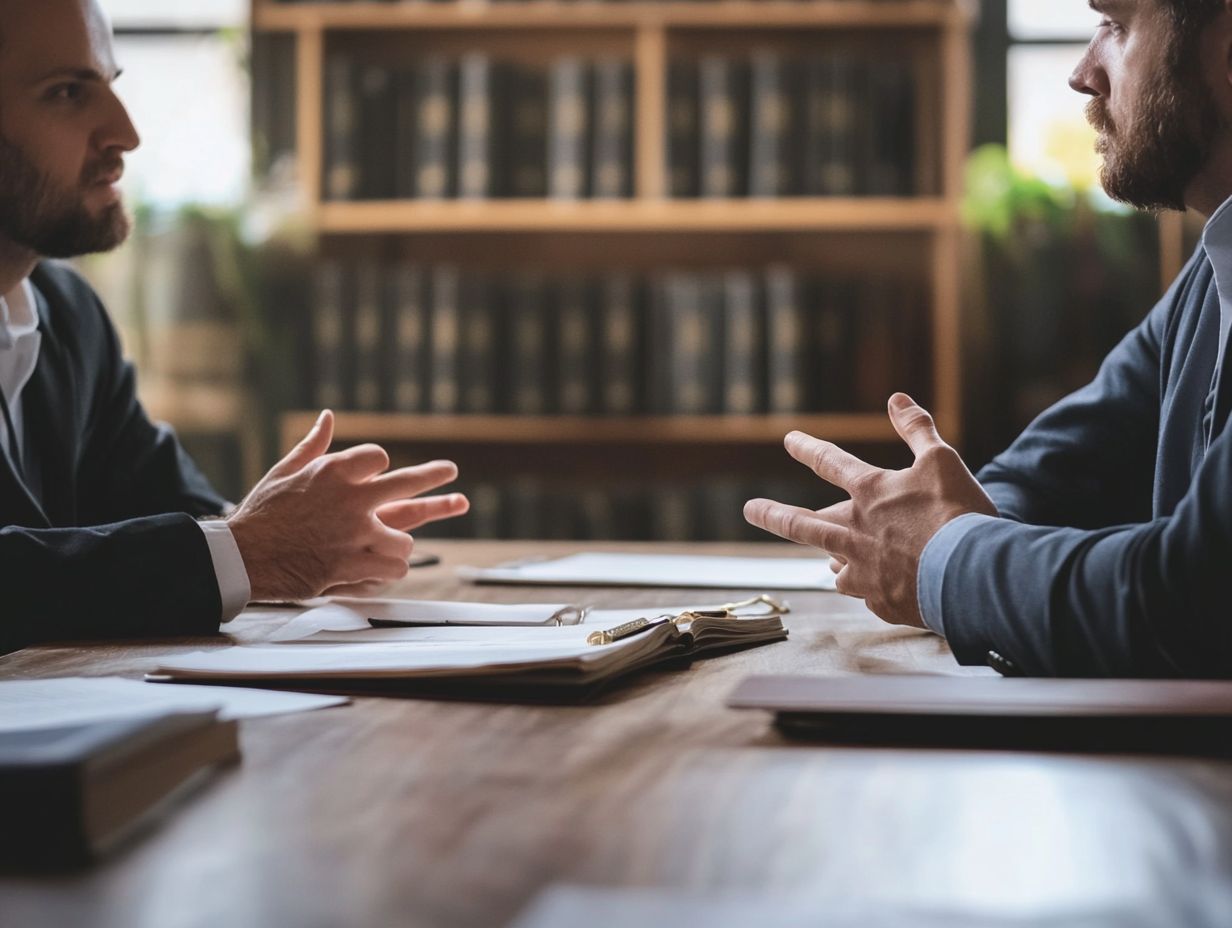
Defense counsel plays a crucial role in the legal system by advocating for their clients and ensuring a fair trial. Effective communication and strategic planning are essential for building a strong defense. Expert witnesses provide valuable insights and evidence that can strengthen a defense case.
The Importance of Defense Counsel
The importance of defense counsel in the criminal justice system cannot be overstated. They are the cornerstone of ensuring you receive fair legal representation throughout the legal process.
In Massachusetts, your defense counsel takes on many responsibilities. They guide you through the complex maze of criminal charges, clearly articulate your legal rights, and formulate effective case strategies tailored to your situation.
Without skilled defense counsel, you may find yourself navigating the treacherous waters of criminal prosecution without the support needed to safeguard your legal interests and uphold the principles enshrined in the US Constitution.
Understanding the Role of a Defense Counsel
Having a skilled defense counsel is crucial. They advocate for you and navigate the legal landscape to protect your rights.
In this pivotal role, the defense counsel manages legal arguments and evidence along with the nuances of courtroom dynamics. They craft personalized defense strategies that consider the unique details of your case while ardently challenging the prosecution’s assertions.
Grasping courtroom procedures is essential, as it gives them the power to contest evidence and witness testimonies effectively. With strong communication skills, they present compelling arguments and negotiate with finesse, maintaining a professional demeanor that cultivates trust and confidence within the legal system.
Building a Strong Defense
Building a strong defense is crucial for any criminal case. It requires careful preparation for the trial, thorough analysis of evidence, and the art of crafting a compelling narrative that resonates with juries.
Strategies and Tactics Used by Defense Counsel
Defense counsel employs a range of strategies and tactics, including self-defense and duress claims, to navigate courtroom complexities. These approaches demand a keen understanding of the prosecution’s evidence, which is vital for formulating a robust case strategy.
Negotiating plea bargains agreements where a defendant pleads guilty to a lesser charge can provide a strategic advantage, allowing you to secure a more favorable outcome while minimizing trial risks. Introducing expert witnesses can further strengthen your defense by offering credible insights that effectively challenge the prosecution’s claims.
Ultimately, a thorough understanding of both legal principles and the specifics of your case significantly enhances your overall defense strategy.
Effective Communication with Clients
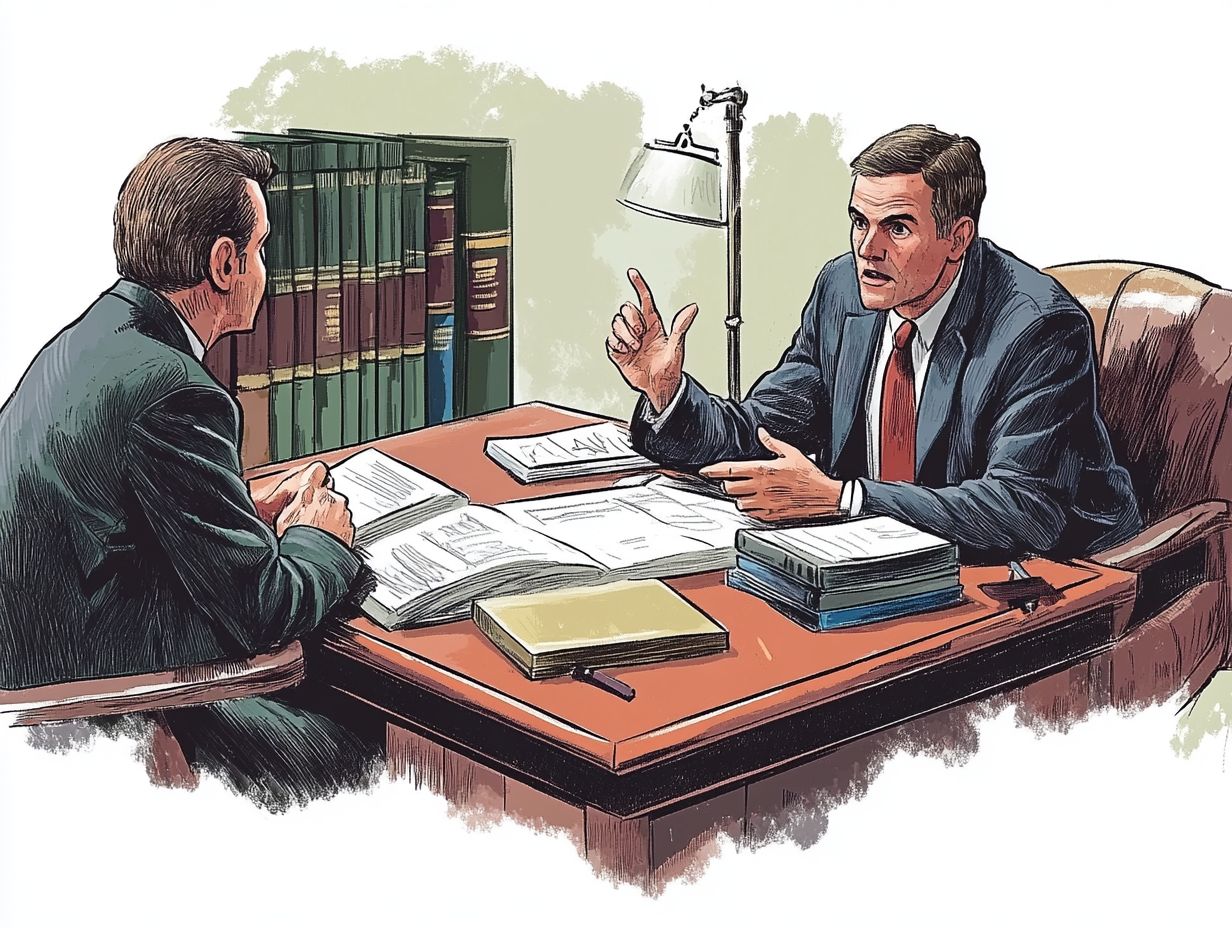
Effective communication with clients is the cornerstone of successful legal representation. It fosters a deeper understanding and cooperation between defense counsel and defendants, guiding them through their legal journey.
If you face criminal charges, seeking skilled defense counsel is essential. Their expertise can help ensure you get the fair representation you deserve.
Ensuring Understanding and Cooperation
Ensuring a solid understanding and strong cooperation between you and your defense attorney is essential for crafting an effective legal defense.
This collaboration helps you successfully navigate courtroom procedures.
To achieve this, your defense counsel might employ strategies like:
- Simplifying legal jargon
- Using visual aids to clarify complex legal concepts
- Scheduling regular meetings to keep you informed about case updates
These techniques make the legal process clearer and empower you to actively engage in your defense.
Building a relationship based on trust and open communication enables your attorney to address any concerns or misconceptions that may arise.
This collaborative approach does more than just shape a comprehensive defense strategy; it also enhances your preparedness for trial.
As you become more informed about courtroom expectations and your role within the process, you’ll feel more confident and ready to face whatever comes next.
The Use of Expert Witnesses
Using expert witnesses can truly transform a criminal defense case. They provide important evidence analysis and witness testimony that enriches your courtroom strategy.
These insights fortify your arguments, making them more compelling and persuasive.
How Expert Witnesses Can Strengthen a Defense
Expert witnesses can significantly bolster your defense by providing specialized knowledge that informs courtroom dynamics.
Their insights become particularly invaluable in complex situations, such as mental health cases, where a deep understanding of psychological evaluations can profoundly influence how jurors perceive the facts.
For instance, the testimony of a forensic psychologist could illuminate the defendant’s mental state at the time of the alleged crime.
This can shape jurors’ views on culpability in a compelling way.
In cases involving police misconduct, an expert in law enforcement practices can clarify procedural deviations.
This enhances your defense narrative by spotlighting systemic failures rather than individual faults.
These testimonies do more than clarify intricate details; they also lend credibility to your defense.
Ultimately, they can sway jury opinions towards a more nuanced understanding of the situation at hand.
Negotiating Plea Deals
Negotiating plea deals is a vital component of the criminal defense process. It offers the opportunity to secure reduced charges or sentences while safeguarding your legal rights.
This strategic maneuver can significantly impact the outcome of your case and ensures that you navigate the complexities of the legal system with control and foresight.
When and How to Negotiate
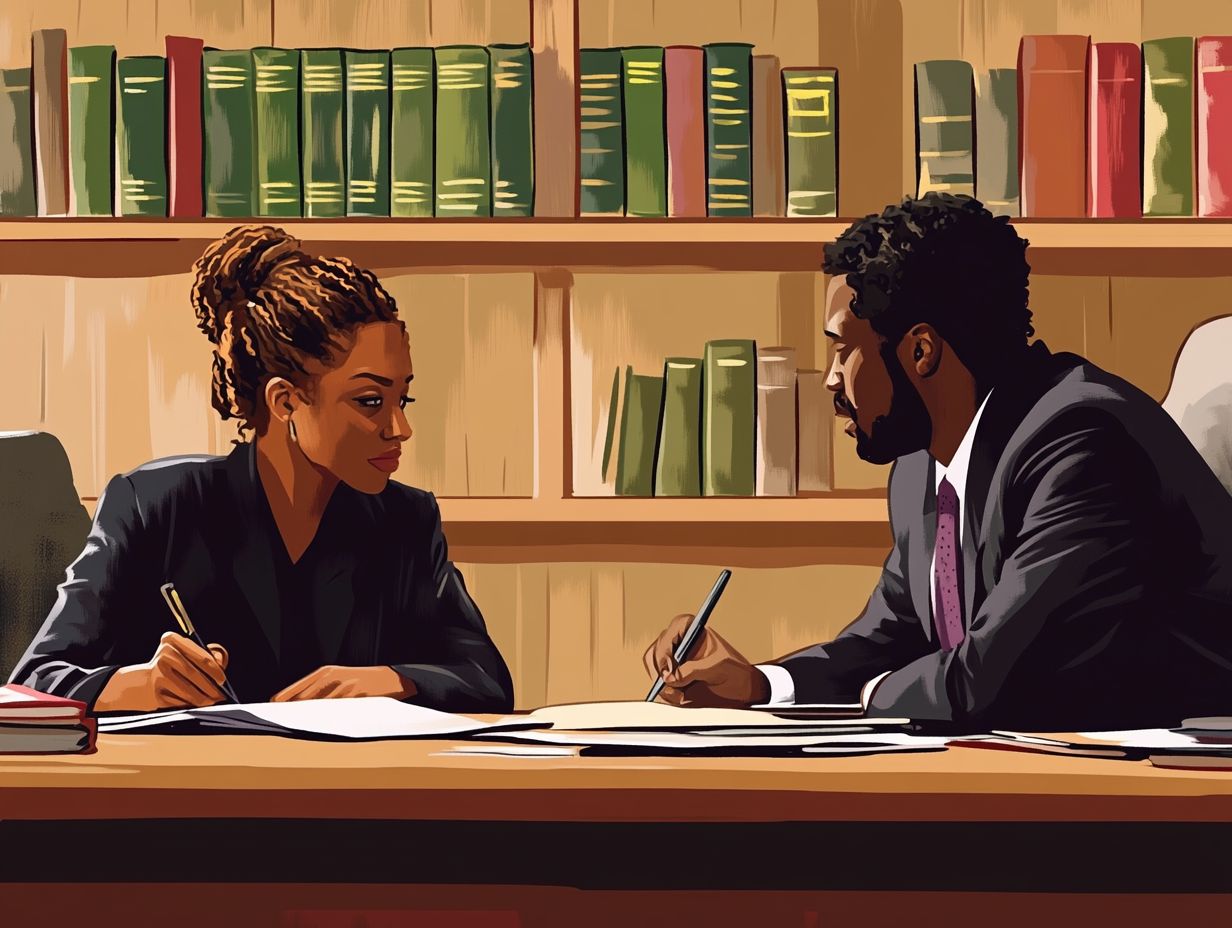
Knowing when and how to negotiate plea deals is essential for a defense attorney.
It can greatly influence the outcome of the case, legal fees, and courtroom strategy.
A strategic approach to timing those negotiations is crucial, especially as you assess the strengths of the prosecution s case and the potential risks involved.
Being aware of nuances like the court s schedule, the judge’s tendencies, and the prosecutor’s workload can significantly impact when you engage in these discussions.
Balancing your client s expectations with realistic outcomes requires a thorough understanding of the legal landscape.
You also need the interpersonal skills to engage effectively with the prosecution.
An informed attorney will approach negotiations with a focus on collaboration rather than confrontation.
Seek solutions that meet the needs of all parties involved.
Preparing for Trial
Getting ready for trial is crucial and requires careful attention to every detail.
You must engage in comprehensive evidence analysis, familiarize yourself with courtroom procedures, and develop a strong defense strategy to counter any prosecution evidence that may arise.
Act quickly! Knowing the right time to negotiate can change everything for your case.
Gathering Evidence and Crafting a Defense Strategy
Gathering evidence and crafting a defense strategy are crucial parts of preparing for a trial. They can greatly influence the outcome of your case in the criminal justice system.
The methods for collecting evidence vary widely. You might conduct witness interviews, analyze physical evidence, or review surveillance footage.
Each piece of evidence is vital to solving the larger puzzle of your case. Properly analyzing this evidence shapes your defense and helps you anticipate the prosecution’s strategies.
How you present this evidence and counter opposing arguments is essential for persuading the jury. The strategies you use to gather and present evidence are key to your defense’s success.
Preguntas Frecuentes
Cu l es el papel del abogado defensor en las estrategias?
El abogado defensor aboga por su cliente. Esto incluye desarrollar una estrategia de defensa, investigar y representar al cliente en el tribunal.
Por qu es importante el papel del abogado defensor en las estrategias?
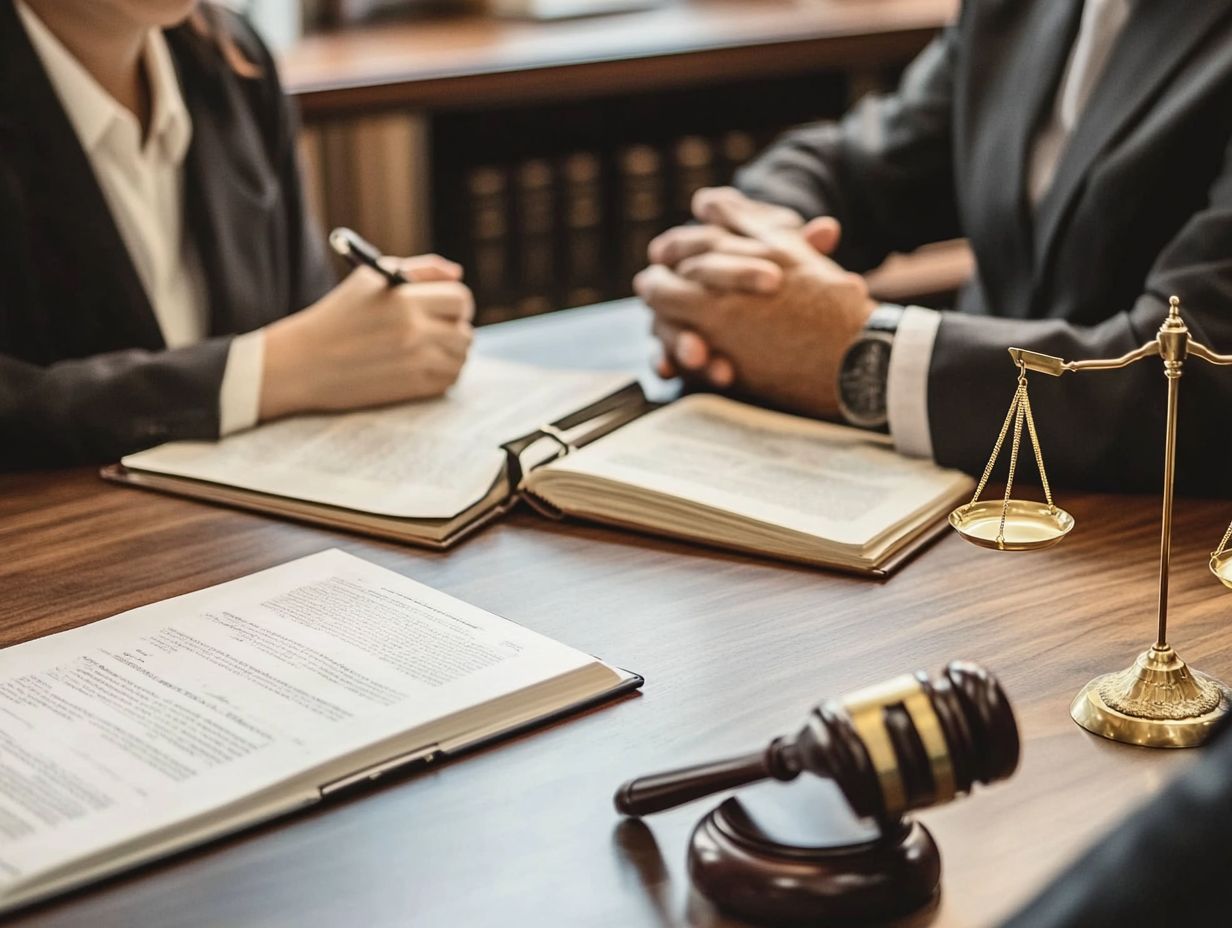
El papel del abogado defensor puede afectar el resultado de un caso. Un abogado h bil identifica debilidades en el caso de la acusaci n y construye una defensa s lida.
Cu les son algunas estrategias de defensa comunes utilizadas por los abogados defensores?
Las estrategias comunes incluyen impugnar pruebas, presentar coartadas o defensa propia, y cuestionar la credibilidad de testigos. Cada caso es nico y requiere una defensa personalizada.
C mo difiere el papel del abogado defensor en casos penales y civiles?
En casos penales, el abogado trabaja para probar la inocencia del acusado. En casos civiles, el objetivo es minimizar la responsabilidad para el acusado.
Qu cualidades debo buscar en un abogado defensor para mi caso?
Busque experiencia, conocimientos legales, y buenas habilidades de comunicaci n. Es esencial que el abogado genere confianza y seguridad en su capacidad para manejar su caso.
Puede un abogado defensor usar cualquier estrategia para defender a su cliente?
No. El abogado debe seguir normas ticas y no usar estrategias ilegales. Debe actuar en el mejor inter s del cliente, basando sus t cticas en principios legales s lidos.

